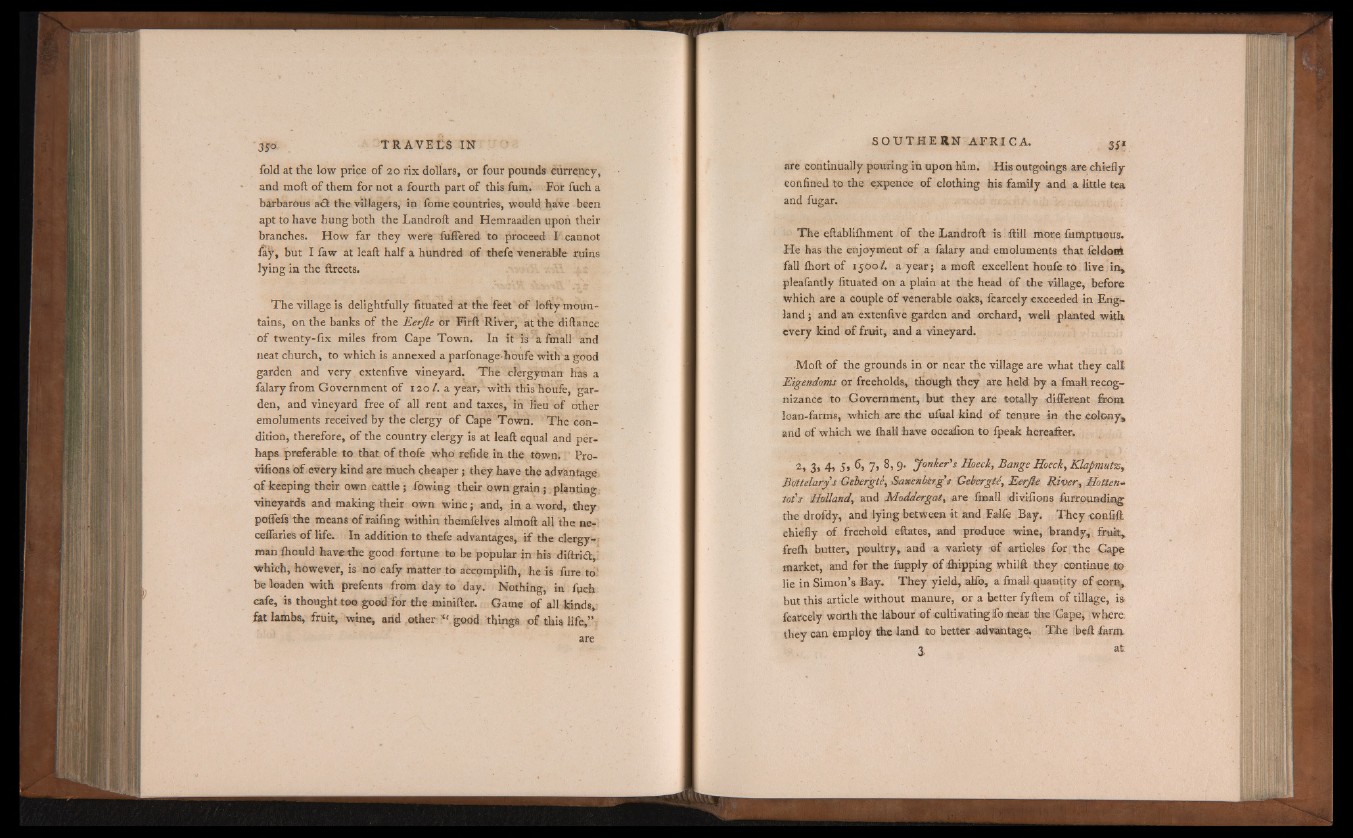
fold at the low price of 20 rix dollars, or four pounds currency,
and mod of them for not a fourth part of this fum. For fuch a
barbarous a£t the villagers, in fome countries, would have been
apt to have hung both the Landroft and Hemraaden upon their
branches. How far they were fuffered to proceed I cannot
lay, but I faw at leaft half a hundred of thefe venerable ruins
lying in the ftreets.
The village is delightfully fituated at the feet of lofty mountains,
on the banks of the Eerjie or Inrft River, at the difiance
of twenty-fix miles from Cape Town. In it is a finall and
neat church, to which is annexed a parfonage-houfe with a good
garden and very extenfive vineyard. The clergyman has a
falary from Government of 120 /. a year,‘with this houfe, garden,
and vineyard free of all rent and taxes, in lieu of other
emoluments received by the clergy of Cape Town. The condition,
therefore, of the country clergy is at leaft equal and perhaps
preferable to that of thefe who refide in the town, f Pro-
vifions of every kind are much cheaper j they have the advantage
of keeping their own cattle; fowing their own grain; planting
vineyards and making their own wine; and, in a word, they
poffefs the means of raifing within themfelves almoft all the ne-
ceflaries of life. In addition to thefe advantages, if the clergyman
Ihould have the good fortune to be popular in his diftricft,'
which, however, is no eafy matter to accomplifh, he is fure to
be loaden with prefents from day to day. Nothing, in.foch
cafe, is thought too good for the minifter. Game of all kinds,
fet lambs, fruit, wine, arid other “ good things of this life,”
are
are continually pouring in upon him. His outgoings are chiefly
confined to the expence of clothing his family and a little tea
and fugar.
The eftabliihment of the Landroft is ftill more fumptuous.
He has the enjoyment of a falary and emoluments that feldout
fall Ihort of 150o l. a year; a moft excellent houfe to live in,
pleafantly fituated on a plain at the head of the village, before
which are a couple of venerable oaks, fcarcely exceeded in England
; and an extenfive garden and orchard, well planted with,
every kind of fruit, and a vineyard.
-Moft of the grounds in or near the village are what they call
Eigendoms or freeholds, though they are held by a fmaH recognizance
to Government, but they are totally different from
loan-farms, which are the ulual kind o f tenure in the colony,
and of which we lhal'l have oocaifion to fpeak hereafter.
2, 3, 4, 5, 6, 7, 8,9. Jonier’s Hoeck, Bange Hoeck, Klapmutz,
Bottelary's Gebergte, Saxea&erg’t Gebergte, Eerjk River, Hottentot's
¡Holland, and Maddergat, are finall divifions Unrounding
the drofdy, and lying between it and Falfe Bay. They ■confift
chiefly of freehold eftates, and produce wine, brandy, fruit,
frefh butter, poultry, and a variety of articles for the Gape
market, and for the fupply of fliipping whilft they continue to
lie in Simon’s Bay. They yield, abb, a finall quantity of corn,
hut this article without manure, or a better fyftem of tillage, in
fcarcely worth the labour of culti vating ifo meat the Gape, where
they can employ the land Co better advantage. The heft farm
a at